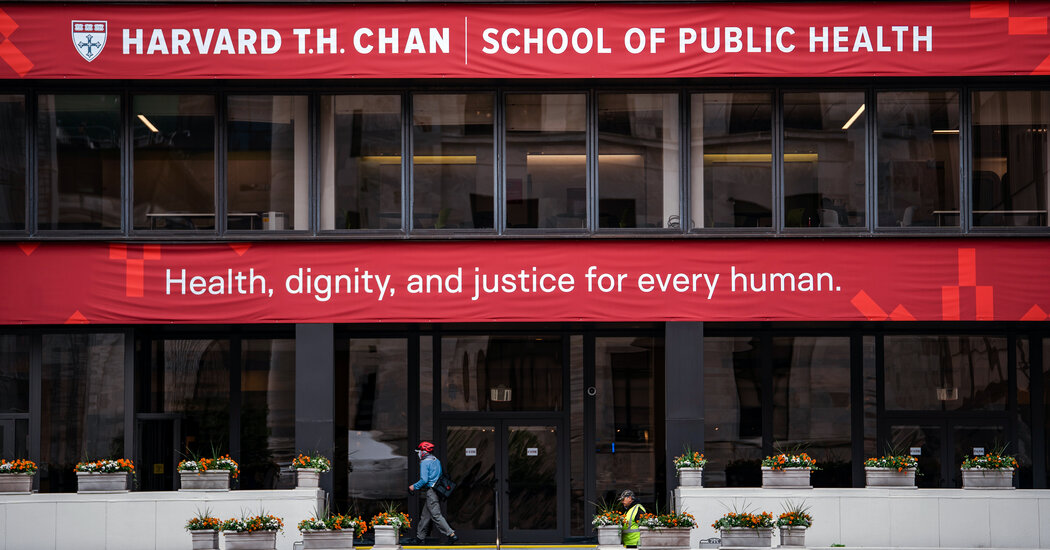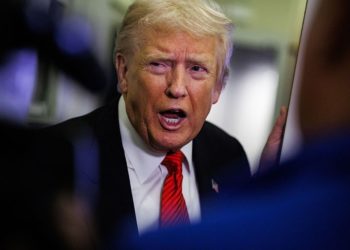Secretary of State Marco Rubio is pushing to investigate whether Harvard University violated federal sanctions by collaborating on a health insurance conference in China that may have included officials blacklisted by the U.S. government, according to people familiar with the matter and documents reviewed by The New York Times.
Mr. Rubio signed off on a recommendation to the Treasury Department last month to open an investigation, which experts and former Treasury officials said was an unusual attempt from a cabinet secretary to target a domestic entity for sanctions enforcement.
Whether the agency within the Treasury that handles sanctions, the Office of Foreign Assets Control, opened an investigation in response was unclear — but such a move could expose Harvard to significant legal risks. Mr. Rubio’s action is the latest example of the Trump administration’s whole-of-government approach to bringing the Ivy League university to heel.
President Trump has sought for months to impose his political agenda on Harvard by reshaping its curriculum, admissions and hiring processes. The effort initially relied primarily on accusations that university officials had not done enough to address antisemitism on campus. In recent weeks, however, the administration’s focus has expanded to other issues, including allegations about Harvard’s foreign ties, particularly to China.
A potential sanctions investigation demonstrates how Harvard’s problems with the government extend far beyond questions of whether the school will continue receiving federal funding. Mr. Trump and his allies appear determined to upend nearly all aspects of the institution, which has long symbolized the pinnacle of higher learning in the country and attracted influential scholars from around the globe.
A spokesman for the Treasury Department declined to comment on a possible or pending sanctions investigation. A State Department spokeswoman also declined to comment.
The health insurance conference, known as the Training Course on Health Financing, began in 2019 as a joint venture between Harvard, the World Bank and the National Health Insurance Administration, the arm of the Chinese government that oversees the state-backed health care system, according to the university’s website. Over the years, training has focused on topics like “innovative provider payment methods” and “pricing and payment for internet health.”
The university has promoted the event, which in some years has drawn upward of 200 people, as a key part of a broader “Harvard China Health Partnership” inside its T.H. Chan School for Public Health. University officials have previously described the event as aimed at expanding access to high-quality health care for 1.4 billion people in China.
Behind Mr. Rubio’s sanctions push is the presence of officials from a Chinese state-run group called the Xinjiang Production and Construction Corps at some, if not all, of the conferences since 2019. The X.P.C.C. is known in northwest China for building towns and running its own university and hospital systems. The group is also responsible for systemic human rights abuses against Uyghurs and other ethnic minorities in the region, according to the U.S. government.
The Chinese government formed the X.P.C.C. more than seven decades ago as a paramilitary organization tasked with settling a distant region with many ethnic groups and some militias. The Treasury Department imposed sanctions on the group in 2020.
Harvard has been conducting an internal review into the X.P.C.C.’s involvement at the conference, but it was unclear what details had been turned up, according to two people familiar with the inquiry who insisted on anonymity to discuss internal university deliberations.
A Harvard spokesman declined to comment.
An archived version of a Harvard webpage about the inaugural conference noted that participants in the training included the Xinjiang Production and Construction Corps. That event occurred one year before the U.S. government targeted the group for sanctions, but mention of the X.P.C.C. has since been deleted.
A Chinese government website about the 2023 conference shows that participants that year — three years after the U.S. imposed sanctions on the X.P.C.C. — included Chinese health officials, scholars from “top universities,” such as Harvard, and representatives of the Xinjiang Production and Construction Corps.
Still, the X.P.C.C.’s involvement in the conference only recently gained attention from Trump allies, after a report about Harvard’s links to China published on April 22 by Strategy Risks, a New York-based intelligence company specializing in corporate exposure to China. The report was funded by the Manhattan Institute, a conservative think tank that has advised Republican policymakers.
Since then, the report’s details have been highlighted in news articles from conservative media outlets and public statements from Republican officials.
On May 15, Senator Tom Cotton of Arkansas cited the Strategy Risks report in a letter to Mr. Rubio and Treasury Secretary Scott Bessent, urging an investigation into Harvard’s public health school. On May 19, Republicans on the House education committee sent a request for records to Harvard about, in part, the X.P.C.C.’s involvement in the conference.
On May 22, the Department of Homeland Security said that Harvard had “hosted and trained” members of the group and included a link to a Fox News article about the House Republican records request in its news release.
Investigations of potential sanctions violations could take months or years, while penalties range from a cautionary letter from the government to significant financial damages.
Other cabinet secretaries — like the secretary of state — often coordinate with the treasury secretary on foreign individuals, groups or countries that they believe should be subject to sanctions. But it is atypical for the nation’s chief diplomat to single out an American individual, group or company for a potential violation, according to John Smith, a former director of the Treasury Department’s Office of Foreign Assets Control.
Sanctions investigations, Mr. Smith said, are typically started after reporting in media or from companies, the intelligence community or law enforcement.
“I wouldn’t say it’s wrong or improper — I would just say it’s unusual and not the usual course of business,” Mr. Smith said.
Typically, after learning of a potential violation, the Office of Foreign Assets Control decides whether to open an investigation. If the office ultimately finds wrongdoing, the Treasury could impose civil penalties and recommend that the Justice Department pursue criminal charges. In particularly egregious instances, companies can be hit with civil and criminal penalties that come with fines as high as billions of dollars.
Harvard has confronted a tumultuous two months since Mr. Trump set his sights on the school. In some ways, Harvard has been victimized by the success of its yearslong push to expand its global influence, which has abruptly crashed into the nationalist impulses fueling Mr. Trump’s “America First” agenda.
Many of Harvard’s attempts at inroads in China began relatively recently, when Washington was engaged with Beijing as a strategic and economic partner. China is now viewed more widely as an adversary, a shift that accelerated during Mr. Trump’s first administration.
Harvard brought an initial lawsuit against the administration in April, accusing the government of trying to assert control over the school with threats to cut federal funding. By then, the Trump administration had already blocked $2.2 billion in various grants. Since the lawsuit was filed, the university and its research partners have lost nearly another $1.5 billion in support from the National Institutes of Health, the Defense Department and other federal agencies.
The university is also fighting in court over an effort from Mr. Trump and the Homeland Security Department to revoke visas from Harvard’s international students, who account for about one-fourth of the student body, and bar them from the country. Harvard has been targeted by additional investigations from the Education Department, the Equal Employment Opportunity Commission, the Health and Human Services Department and the Justice Department.
Isaac Stone Fish, the founder and chief executive of Strategic Risks, said he started his company in 2021 after working as a journalist in Beijing. In 2022, he published a book, “America Second,” that traces the recent transition of the U.S.-China relationship, from economic partners to open rivals.
Mr. Stone Fish said his report, cited by conservatives, should not be read as a “blanket condemnation” of Harvard. He praised the university for pushing ahead on what he described as crucial research and scholarship into China. But he also argued that the X.P.C.C. was “one of the world’s most notorious organizations” and that the university’s partnerships should be held to a high standard.
Education Secretary Linda McMahon, speaking at a Bloomberg News event in Washington on Tuesday, defended the administration’s punishing approach to Harvard and said it was a way to shift an ideological tilt she views as hostile to conservatives.
Asked to summarize the administration’s successes so far in its battle with Harvard, she pointed to the departure of two faculty members in March from the university’s Center for Middle Eastern Studies.
“We have noticed that they did replace their head of Middle Eastern studies because they felt that they needed to make some adjustments there,” Ms. McMahon said. “So we’re pleased to see that.”
All of the federal funding cuts for Harvard — and eight of the 10 federal investigations into the university — have happened since the professors left campus.
Michael C. Bender is a Times political correspondent covering President Trump, the Make America Great Again movement and other federal and state elections.
Michael S. Schmidt is an investigative reporter for The Times covering Washington. His work focuses on tracking and explaining high-profile federal investigations.
The post Rubio Is Pressing to Open Sanctions Investigation Into Harvard appeared first on New York Times.




